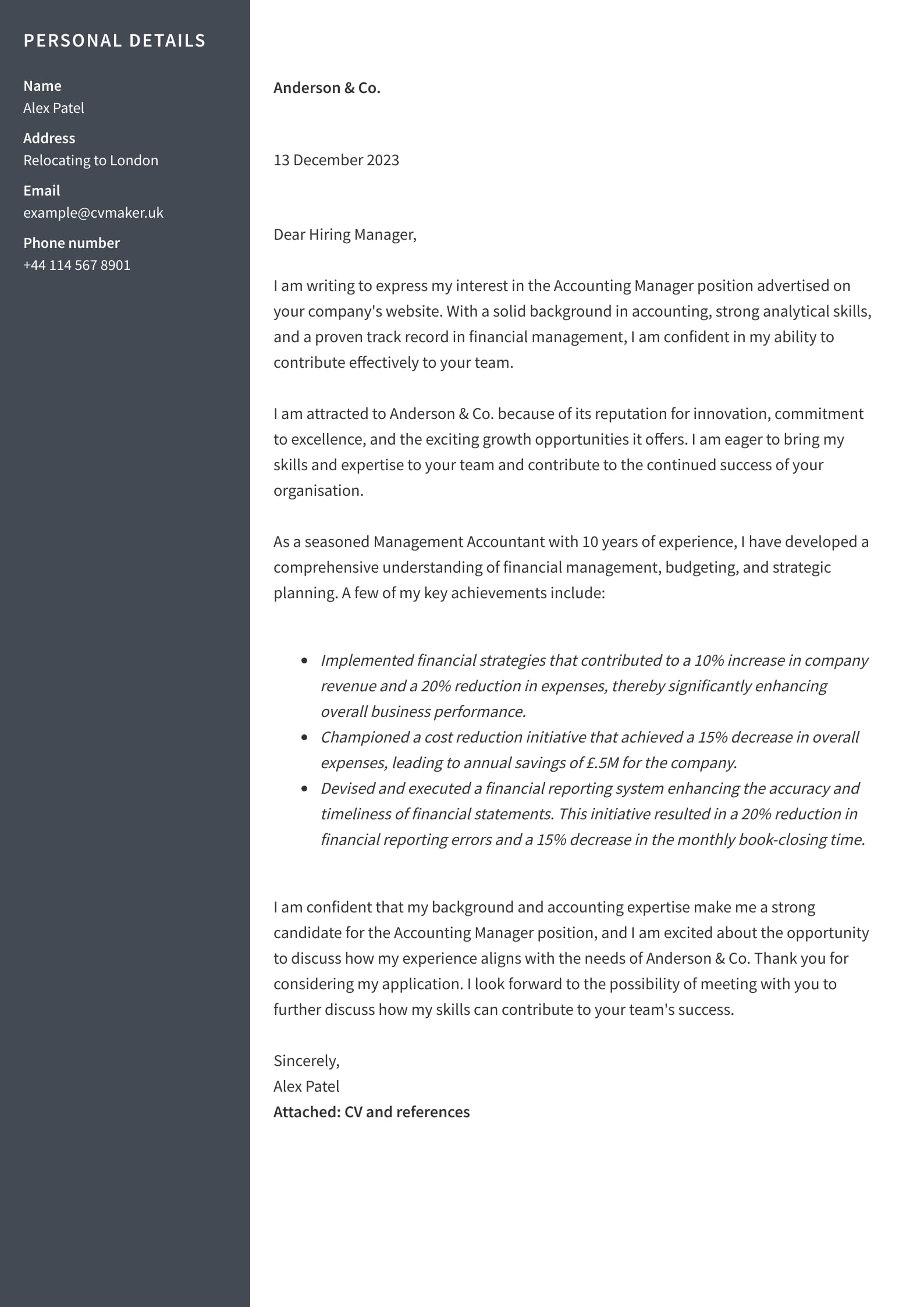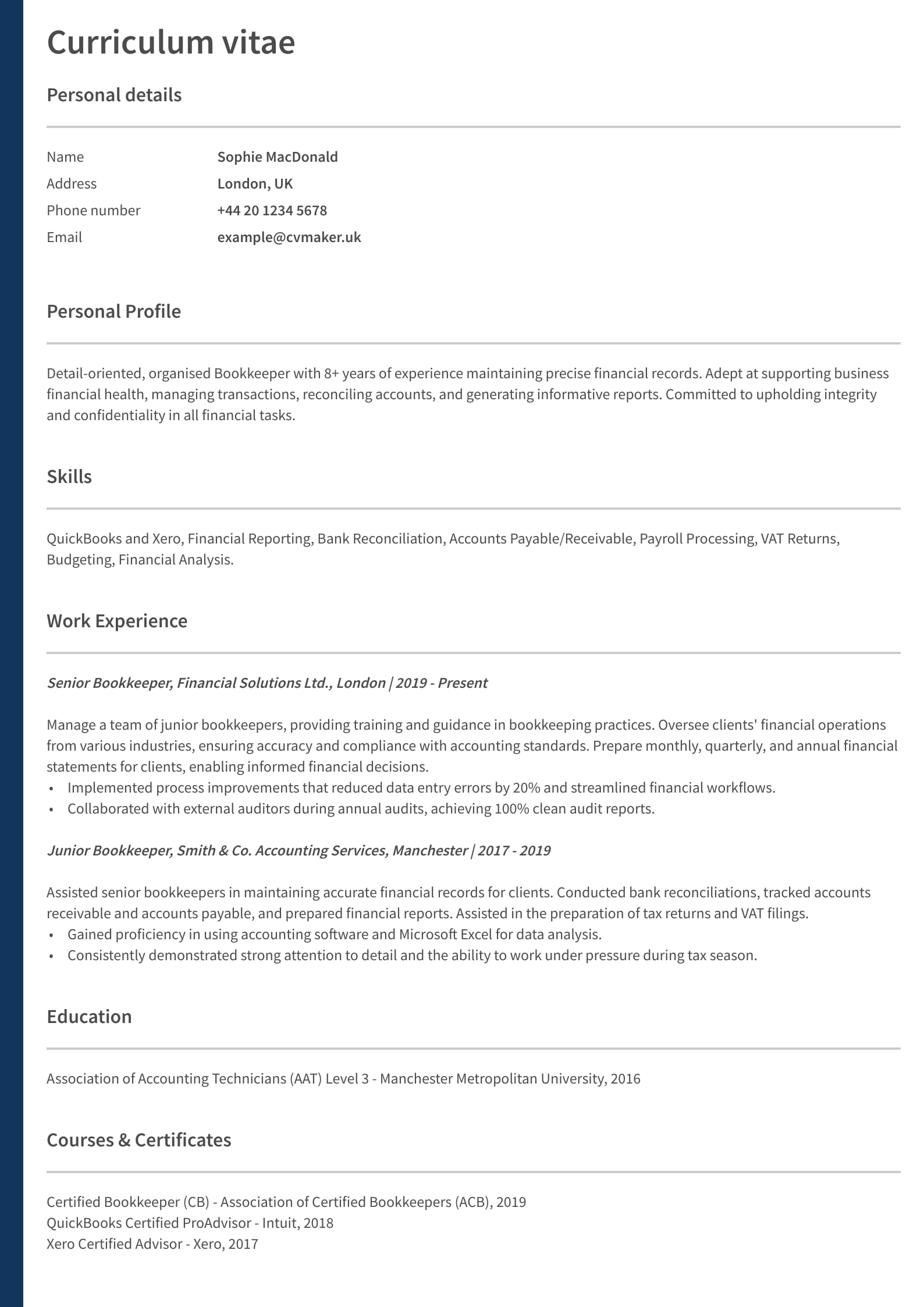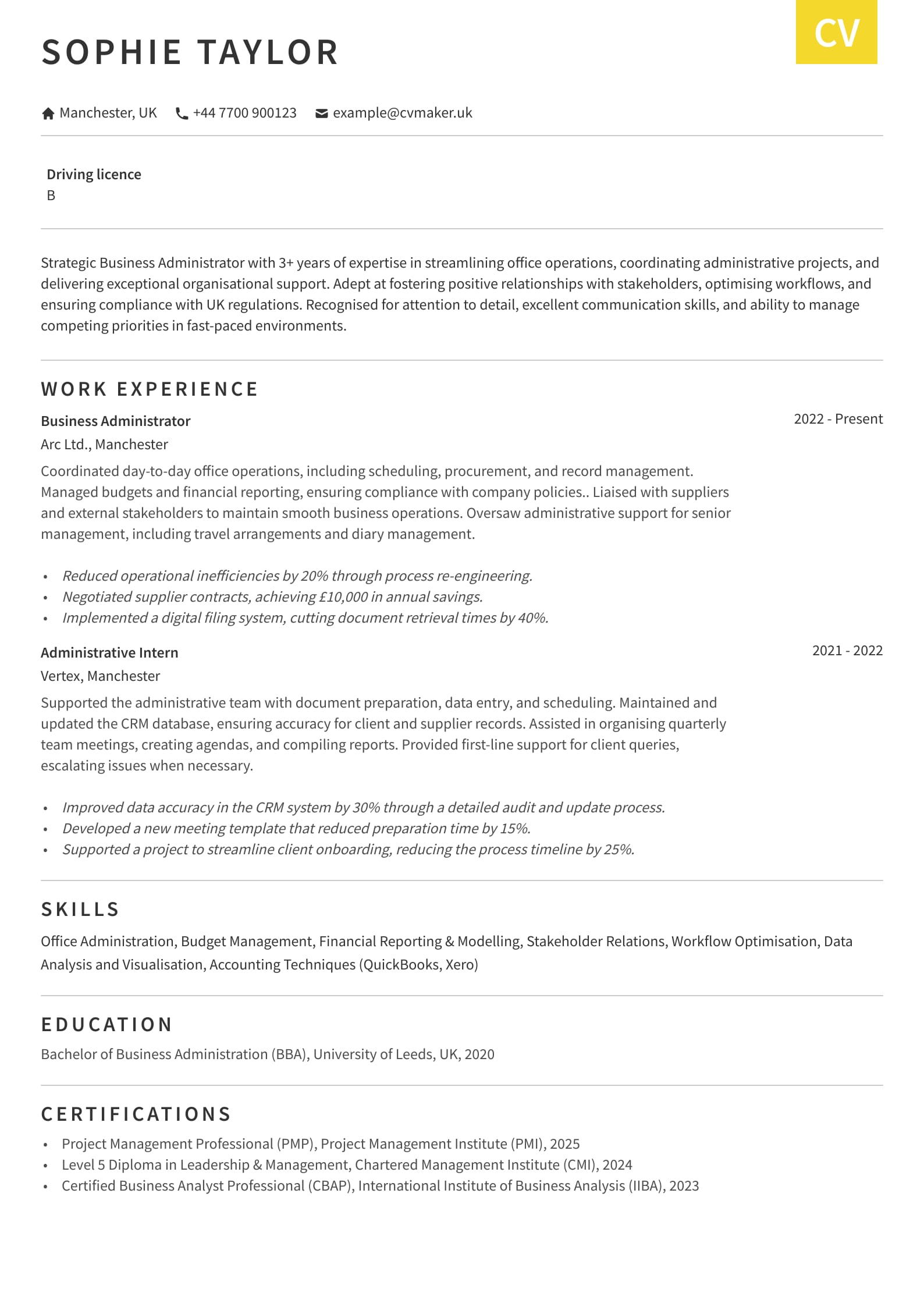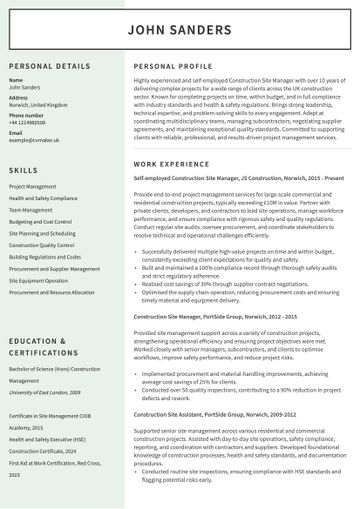
How to Write an Accountant CV Guide (Tips and Examples)
As an experienced or aspiring accountant, your CV is your ticket to landing your dream job in this highly competitive field. However, crafting a professional CV that effectively showcases your relevant skills and experience can be challenging. The goal is to strike a balance between providing enough detail to demonstrate your proficiency while ensuring your CV remains concise, applicant tracking system (ATS) friendly, and tailored to your career goals.
This article offers a comprehensive guide to creating a modern CV showcasing your expertise and experience. We cover everything from highlighting your qualifications to demonstrating your analytical and problem-solving abilities. We aim to help you create a powerful CV that takes you one step closer to achieving your career goals.
In this article we cover:
Essential sections for an accountant CV.
What to include in a CV profile for an accountant.
How to showcase relevant work experience.
Tips for writing an accountant CV with no experience.
Creating a CV is made easy with CVMaker's user-friendly AI CV Maker and a professional CV template.

Accountant CV example
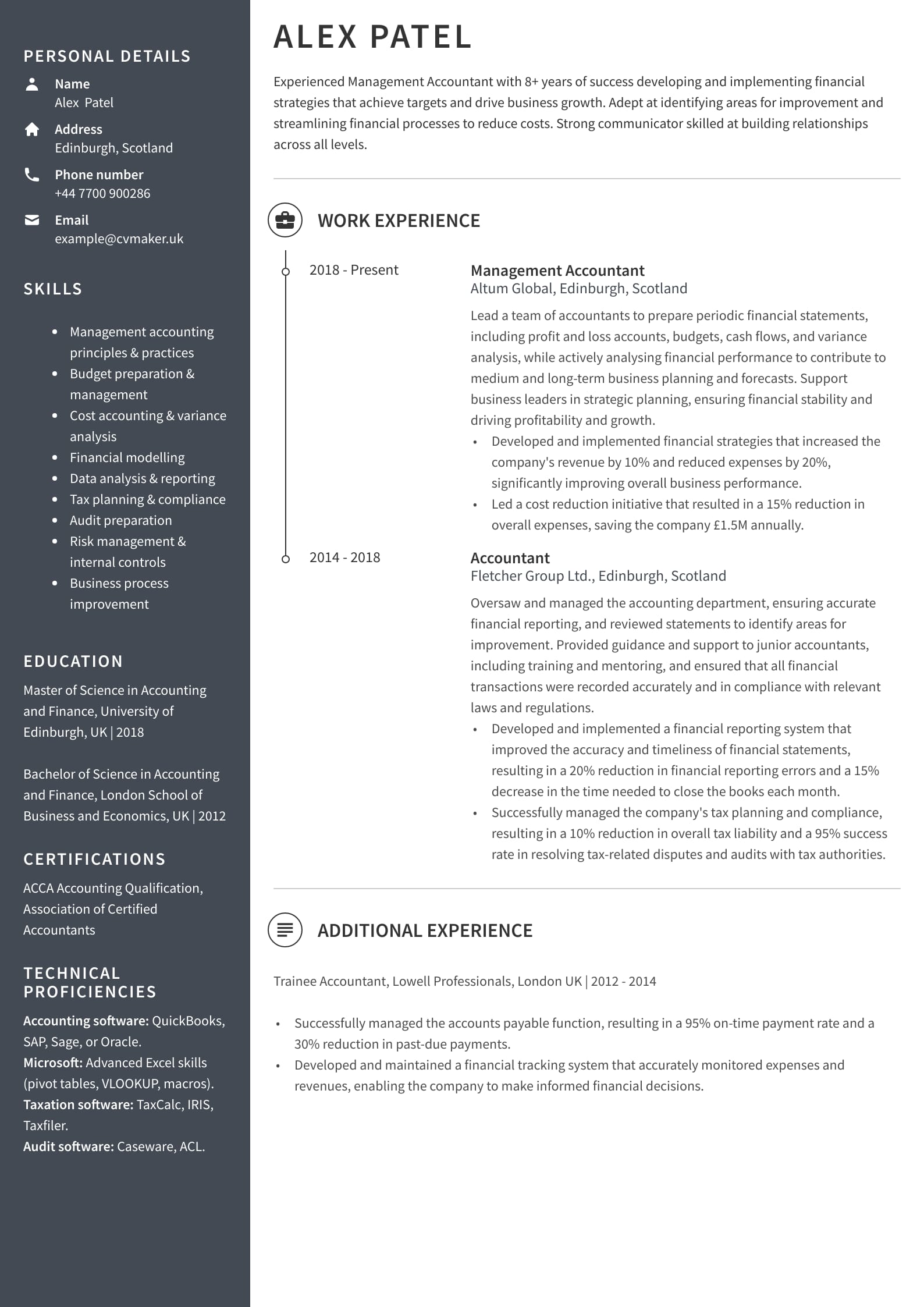
Download this Accountant CV sample in PDF
Alex is a seasoned Management accountant with a passion for financial analysis and the development of strategic financial plans. This CV for an accountant showcases her experience and directly relevant skills to her profession. She possesses exceptional interpersonal and leadership skills and has a proven record of collaborating with and leading various teams. The Harvard CV template highlights Alex's expertise in a clear, concise, and organised way.

What to include in an accountant CV?
When creating an accounting CV in the UK, it’s important to include key sections that provide a comprehensive overview of your qualifications, skills, and experience. These typically include personal details, profile, education, work experience, skills, and any technical proficiencies. By effectively highlighting these sections, you can demonstrate your value as a candidate and capture the attention of potential employers.
Must-have CV sections
Personal details: Include email address and contact number
Personal profile: Summary of your experience and qualifications
Work experience: Use bullet points and action verbs
Skills: Demonstrate your suitability for the role
Education: List your most recent relevant qualifications
Read more about how to tailor your CV for a manager position.
Remember that having an up-to-date and well-crafted job-specific CV is essential for anyone seeking new career opportunities or career advancement. These documents support promotions, salary negotiations, and other career growth opportunities.
Highlight your soft skills and career goals in a personal profile
When crafting a personal profile, it's essential to make a great first impression by highlighting your professional expertise and personal attributes, also known as soft skills. Begin by stating your career goals and aspirations, along with your level of experience in the field of accounting.
Consider incorporating strong adjectives that demonstrate your skills, such as 'meticulous,' 'analytical,' or 'detail-orientated.' You may also want to include your communication and teamwork skills, which are crucial in accounting.
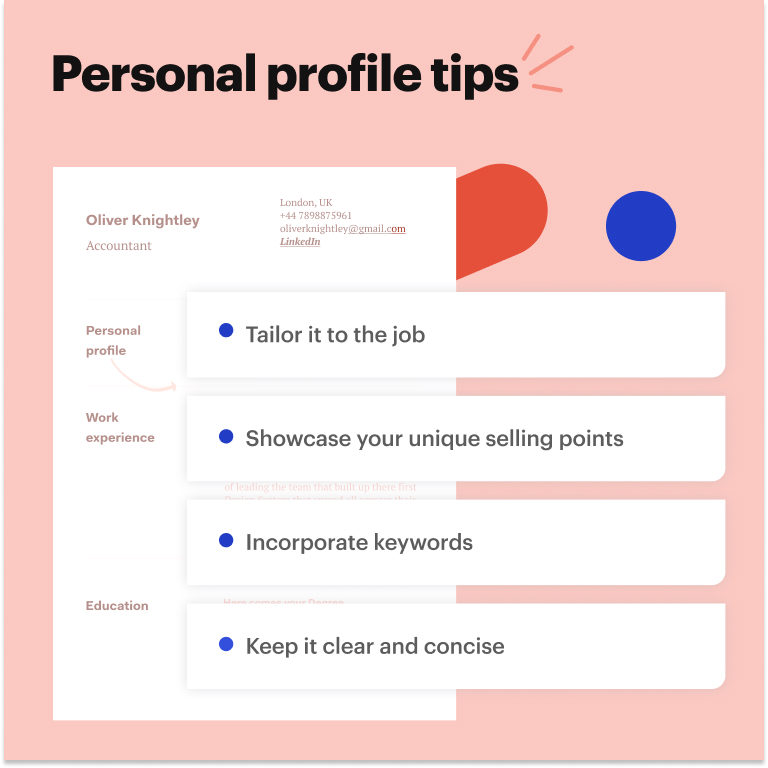
Check out the following examples of an accountant profile for your CV:
Senior Accountant CV personal profile example
Highly motivated and detail-oriented Senior Accountant with a degree in accounting and a CPA license. Proven track record in delivering accurate financial reports and maintaining compliance with regulations. Possess strong analytical skills with experience in handling various financial tasks with ease. Well-versed in relevant accounting software and systems with proven ability to communicate complex financial information clearly and concisely to a range of stakeholders.
Staff Accountant CV personal profile example
Detail-oriented and analytical Staff Accountant with over three years of experience in financial reporting and analysis. Committed to ensuring the accuracy and completeness of financial records. Excellent communication and interpersonal skills with proven ability to collaborate with cross-functional teams. Strong understanding of accounting principles with experience in general ledger reconciliation, accounts payable and receivable, and journal entries.
Management Accountant CV personal profile example
Established Management Accountant with over eight years of experience in accounting and financial management. Adept at leading financial operations and implementing strategic initiatives that drive growth and profitability. Proven track record of managing complex accounting projects, including budgeting, forecasting, and financial analysis, with an unwavering focus on accuracy and attention to detail. Excellent leadership and interpersonal skills with experience in mentoring and developing junior team members.
Tax Accountant CV personal profile example
Highly analytical and detail-oriented Tax Accountant with over five years of experience in tax planning and compliance. Committed to ensuring compliance with tax laws while minimising tax liabilities for my clients. Possess strong understanding of tax codes and regulations and have experience working with various industries, including real estate, manufacturing, and healthcare. Dedicated to continuous learning and professional development by staying up-to-date on the latest tax laws and regulations.
Trainee Accountant/Graduate Accountant CV personal profile example
Recently qualified accounting graduate seeking on-the-job training to earn Certified Public Accountant (CPA). Knowledge of entry-level accounting duties, including but not limited to balancing sheets and general ledger accounts, preparing reports, and updating accounts payable. Excellent communication and interpersonal skills with the ability to solve problems timely and professionally.
Accounts Assistant CV personal profile example
Certified accountant with experience working in rapid-growth, fast-changing environments. Adept at providing proactive support to senior management through reports, reconciliations, and data entry with strong attention to detail. Knowledgeable in accounting standards with hands-on experience using Microsoft Excel and accounting software.
Junior Accountant CV personal profile example
Ambitious Junior Accountant (AAT) seeking to join a forward-thinking accounting firm. Well-versed in accounting and financial reporting principles and practices with strong attention to detail, time management, and communication skills. Knowledgeable of basic accounting duties with internship accountancy experience.
Accounting Clerk CV personal profile example
Diligent and organised Accounting Clerk with a meticulous approach to financial record-keeping. Proficient in data entry, invoice processing, and reconciling accounts. Adept at utilising accounting software and maintaining accurate financial documentation. Strong communication skills and ability to collaborate effectively with team members to ensure smooth financial operations.
Refer to the following CV examples for more inspiration:
Include relevant accounting skills
When it comes to including your skills on a CV, it's important to structure it in a way that makes it easy for the reader to identify and understand your skillset. Soft skills should be incorporated into your personal profile, while hard skills should be a separate section. We recommend including your technical skills or proficiencies as a distinct section on your CV. If transitioning into a new career, try to incorporate transferable skills from your previous roles, including hard and soft skills.
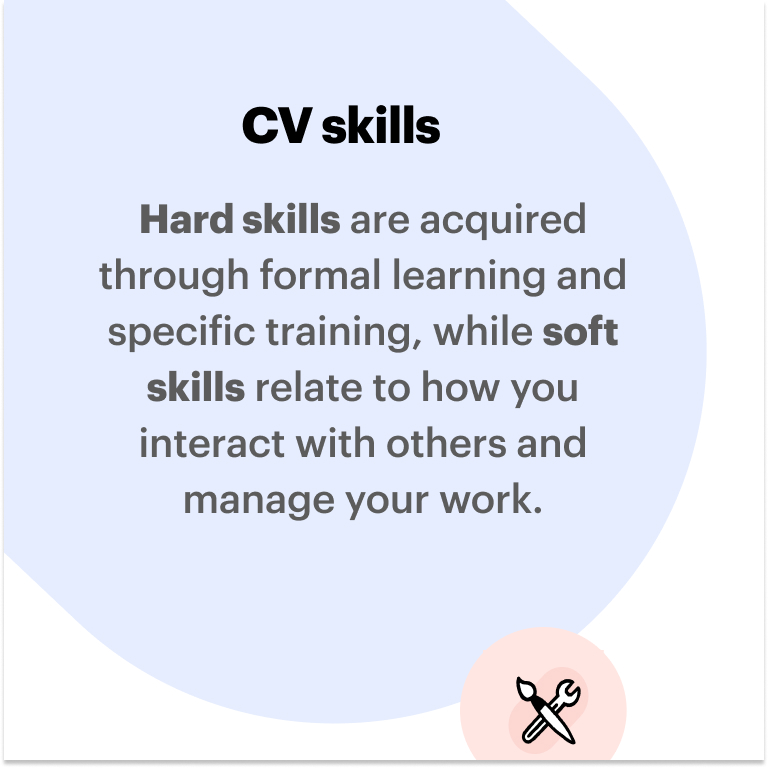
Examples of accounting hard skills:
Financial statement preparation and analysis
Budgeting and forecasting
Tax planning and compliance
Accounts payable and receivable management
Cost accounting
Audit preparation and support
Reconciliation of accounts
Accounting principles and regulations include Generally Accepted Accounting Practice (UK GAAP) and the International Financial Reporting Standards (IFRS).
Examples of accounting soft skills:
Communication and interpersonal skills
Attention to detail and accuracy
Time management and organisational skills
Analytical and problem-solving skills
Adaptability
Teamwork
Analytical skills
Leadership skills.
Showcase accounting work experience
When writing work experience on an ACCA CV, it is important to highlight the specific tasks and responsibilities you performed in each role. Recruiters or hiring managers want to see what you did versus what you achieved. Here are some tips to help you write an effective work experience section for your CV.
What should each work experience entry include?
Job title of current or previous role
Organisation name and location
Dates of employment (month/year)
A concise paragraph detailing your duties
Followed by 2–3 bullet points that highlight your key achievements or measurable impact.
Learn more about the work experience section in a CV.
Example of work experience:
Senior Accountant | KCMG, London, UK | 2018 - Present
Manage month-end close process, including preparation of financial statements and journal entries. Develop and maintain relationships with external auditors and tax advisors, ensuring timely and accurate completion of annual audits and tax filings. Analyse financial data to identify trends and potential areas for improvement and train junior accountants, providing guidance and support to ensure compliance with accounting standards and regulations.
Successfully managed the implementation of a new accounting system, resulting in a 30% increase in the accuracy and timeliness of financial reports.
Developed and implemented an inventory control system, resulting in a 15% reduction in inventory holding costs and a 5% increase in inventory turnover.
Accountant CV example with no experience:
Accounting Student, University of London | 2018 - Present
Strong foundation in accounting principles and practices. Coursework includs the analysis of financial data to identify trends and areas for improvement. Attend networking events, workshops, or seminars organised by the university or professional accounting associations to connect with industry professionals. Stay informed about industry trends, changes in accounting standards, and other relevant developments through reading, seminars, and online resources.
Gained a comprehensive understanding of financial statements, journal entries, and compliance with accounting standards.
Developed valuable skills in team collaboration and leadership during group projects and presentations.
Boost your accountant CV with achievements
Listing achievements on a CV is a great way to showcase your skills, knowledge, and accomplishments. They need to be included in your work experience, but if you are a seasoned professional, consider creating a separate section for your top three or so career achievements or accomplishments. Here are some tips to help you effectively list achievements on your CV:
Focus on quantifiable achievements. Use numbers, percentages, and other metrics to demonstrate the impact of your achievements.
Use strong action verbs to describe your achievements, such as achieved, improved, increased, and reduced.
Tailor your achievements to the job you are applying for. Highlight those that are most relevant to the job description.
Be specific and provide details about the achievement. For example, instead of saying 'reduced costs', you could say 'reduced operating costs by 15% through process improvements.'
Use bullet points to make your achievements stand out and be easy to read.
Group similar achievements together to create a more powerful impact.
Mention relevant education and professional accounting qualifications
When writing the education section on a CV, it is important to highlight your relevant educational achievements and qualifications that demonstrate your knowledge and skills. Whether you are seeking information on how to write an accounting graduate CV or a general accounting CV, we have provided a few tips to help you write an effective education section for your CV:
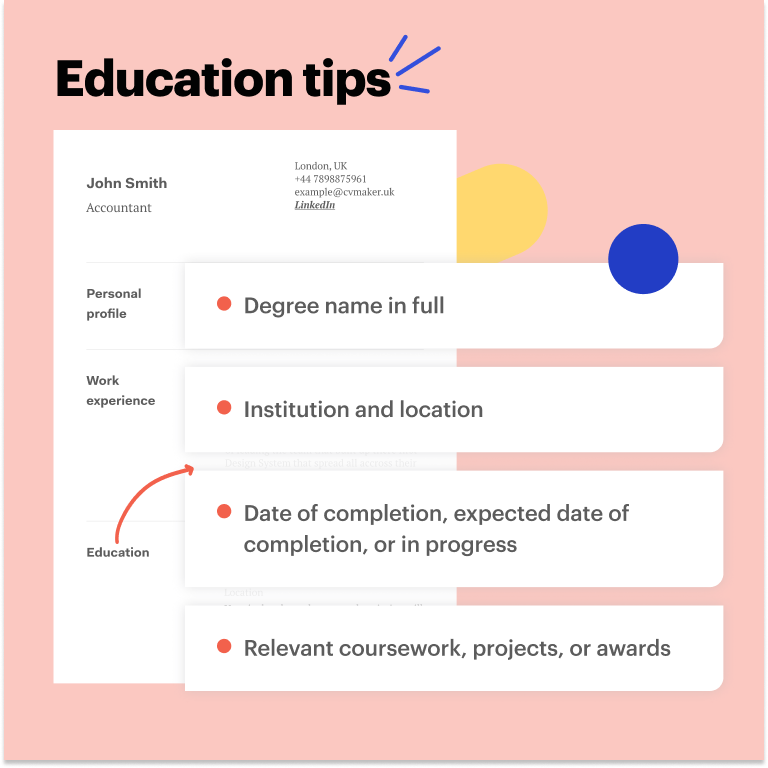
The best qualification for you will depend on your career goals and individual circumstances. There are several qualifications available, including:
Association of Chartered Certified Accountants (ACCA): The ACCA qualification is globally recognized and provides a broad range of accounting, finance, and business skills and knowledge. It is a flexible qualification that allows you to study at your own pace and can be completed through a combination of exams and work experience.
Chartered Institute of Management Accountants (CIMA): The CIMA qualification focuses on management accounting and provides skills and knowledge in financial, strategic, and risk management. It is a globally recognised qualification and can be completed through exams and work experience.
Institute of Chartered Accountants in England and Wales (ICAEW): The ICAEW qualification is a prestigious qualification that provides a broad range of skills and knowledge in accounting, finance, and business. It is a rigorous qualification that requires the completion of a training contract with an approved employer.
Certified Public Accountant (CPA): The CPA qualification is a globally recognised qualification that provides a broad range of accounting, finance, and business skills and knowledge. It is a flexible qualification that can be completed through a combination of exams and work experience and is widely recognized in the US and other countries.
Example of how to write education on a CV:
Master of Science in Accounting, University of London, UK | In progress
Bachelor of Science in Accounting, NML College | UK, 2022
Elevate your CV with courses and certificates
When listing courses and certificates on a CV, it is important to highlight those relevant to the job you are applying for. Here are some tips to help you effectively list courses and certificates on your CV:
Use a separate section for courses and certificates.
List the course or certificate name, the institution or provider, and the date of completion or in progress.
Focus on courses and certificates that demonstrate your skills and knowledge, such as taxation, auditing, financial reporting, and cost accounting.
If you have completed continuing education courses or attended conferences or seminars, you can also include these in this section or try incorporating them into the education section
Only list courses and certificates that are recent or relevant to the job you are applying for.
How to write an accounting CV with no experience
Despite lacking accounting experience, it is possible to craft a compelling CV by showcasing your skills, education, and potential. Consider the below tips:
Emphasise Transferable Skills: Highlight skills, education, and potential, even without direct experience. Showcase transferable skills gained from other jobs or relevant experiences.
Motivation and Enthusiasm: Express motivation to learn and enthusiasm for the field in your personal profile or cover letter.
Showcase Analytical and Numerical Skills: Even with no direct experience, showcase strong analytical and numerical skills on your CV.
Attention to Detail: Highlight attention to detail as a valuable skill.
Highlight Education: If you recently completed a degree or are currently studying, emphasize this prominently on your CV and potentially in your personal profile.
For more tips. refer to how to write a CV with no experience.
Key takeaways
With all this new information on what makes a good CV, we have summarised some key points below.
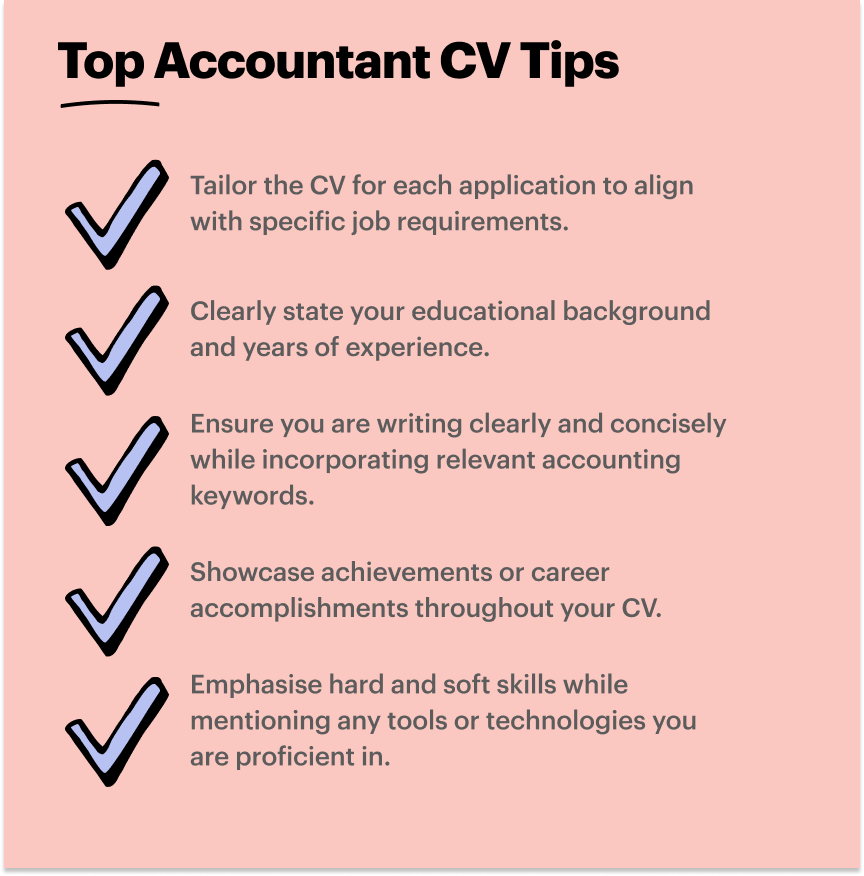
Next steps?
To help you creating outstanding career documents, head over to our CV Writing Services. Our ready-to-use CV and cover letter builder provide over 20 professional CV templates or cover letter templates. Take the next step towards your successful career now!
Additionally, see our related blog article about highest-paying jobs in the UK for more details on salaries and requirements for accountants.
FAQ
What is the best format for an accountant CV?
A good accountant CV must maintain a clear distinction between its key sections, presenting only prelevent information. It is crucial to achieve conciseness, limiting the document to one to two pages, utilising a professional font, and tailoring content for each application. Refer to how long a CV should be for more information. Alternatively, see the below examples for different accounting CV formats:
What makes a good accountant CV?
It should demonstrate a candidate's attention to detail, analytical skills, and ability to manage complex financial information, which are all essential qualities for success in the field of accounting. It is an opportunity for candidates to showcase their educational background, professional certifications, and relevant work experience and to differentiate themselves from other candidates who may have similar qualifications.
How do I become an accountant in the UK?
Becoming an accountant in the UK can vary depending on your qualifications and circumstances. Whether you are applying for an assistant accountant job or a more senior role, typically, there are a few things to consider:
Choose your qualification: There are several accounting qualifications you can choose from, including ACCA, CIMA, and ACA. Research each qualification and choose the one that best fits your career goals. Remember that each qualification has its own entry requirements, but generally, you will need a certain level of education and work experience.
Register with the relevant professional body: Once you have chosen your qualification, you must register with the relevant professional body. For example, if you have chosen ACCA, you will need to register with ACCA.
Complete your studies: Depending on your chosen qualification, you will need to complete a series of exams and/or work-based training.
Gain work experience: Many accounting qualifications require completing some work experience. This is typically gained through a training contract with an approved employer.
Apply for jobs: Once you have completed your studies and gained the required work experience, you can start applying for accounting jobs.
What is the average accountant salary in the UK?
According to Indeed, the average salary of an accountant in the UK is £34,838 per year in United Kingdom.
Where do I get relevant accounting work experience?
If you are looking for an accountancy job, it can be helpful to research opportunities in your local area and reach out to accounting firms and organisations to inquire about potential opportunities. There are several ways to get relevant work experience, including:
Many firms offer internships to students and recent graduates. These internships can provide valuable work experience and help you build your professional network.
You can also gain experience by volunteering with non-profit organisations or community groups. This can be a great way to gain experience while giving back to your community.
If you are still in school or studying for your qualification, you can gain relevant work experience by working part-time in an accounting-related role. Look for opportunities at local businesses or firms.
Many large firms offer graduate schemes that provide recent graduates with structured training and work experience.
If you have already gained some experience, you can consider freelancing or working as a consultant. This can give you the flexibility to work on various projects and gain experience in different areas.
For more inspiration, check out the below CV examples:
